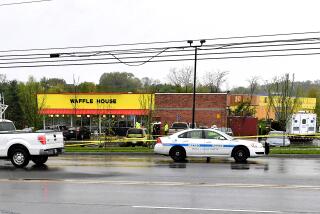Sweet Land of Liberties
- Share via
With a growing sense of disbelief, we fathom our losses: The loss in lives, the loss to our skyline, the loss of our placid sense of security. Then, another loss arises in the collective mind: The fear that our freedoms will be eroded now.
In fatigue and shock, we express this chiefly as a feeling. But we feel it strongly. And you can’t very well argue with feelings, can you?
If you feel scared, you are.
So are we headed for a loss of liberty? No question. But will these losses diminish us in important and lasting ways? I’m not so sure. At the least, now seems like the right time to ponder what freedom and liberty mean at the root. They are more than just feelings. If we calibrate their essentials, we can be guided by something besides jumpy emotions as the United States marches ahead to ... well, just wherever.
It’s notable that in his remarks to the nation President Bush rushed to say that liberty would not succumb to terrorism. I think his timing was laudable. His words were not an afterthought. He spoke with his eyes over the horizon to generations yet to come.
Liberty is, in its broad definition, the sum of those rights that we hold and which define our freedom. Liberty, in fact, is what we propose to defend.
Among our cherished freedoms, not fully realized yet, is the freedom to be different. Is that threatened?
In some ways it already has been--in the show-off vandalism by teenagers and bellicose confrontations by racist knuckleheads against Americans of Middle Eastern heritage. We can expect worse. Hate crimes remind us of the distance that America has yet to travel between its ideals and reality. But the ideal will survive, and ultimately be strengthened. Already, I think it’s safe to say that never have Arab Americans received such firm and united expressions of brotherhood from the nation’s political and civic leaders, and from thinking citizens everywhere.
There has been and will be, yes, more police profiling of “suspicious Arab-looking” people. To expect, or demand, otherwise is probably more than we can ask, or maybe more than we should expect. Many of these incidents will pass with forbearance. Others will flare into civil rights showdowns--and that fact itself will prove how little America will tolerate backsliding toward the days of mass roundups, internments and, we can hope, blacklists.
Naturally the rub will come when law-abiding people here choose to speak out for our foes--an exercise of free speech that will surely test America’s tolerance, as it has before.
But we need only look to the experience of Vietnam to remember that Americans who gave comfort to the enemy, for instance, Jane Fonda, were not denied their place in society.
Our movements will become more tedious and expensive. Government surveillance and eavesdropping will expand. And who knows how many other tiresome, even scary, impositions will follow? Will we be issued gas masks? Will our schools be sandbagged?
These burdens may or may not add up to erosions of freedom, depending on how we collectively regard them and whether our government keeps its head. But we may not have a choice: A free people can also be a besieged people.
For a while, and maybe again and again for a long time, Americans will feel exposed, vulnerable to the religious fanaticism that ulcerates our shrinking world. Who among us knows how this war against terrorism will unfold, how often it will hit home or how hard?
But this country was conceived in war and has fought a civil war, two world wars and six other wars since, not to mention a long Cold War. The essentials of our liberties, sometimes heavily compromised, have proved resilient. And in important ways, such as civil rights and voting rights, they are more firmly rooted now than ever.
Wartime’s greatest imposition on personal liberty--the military draft--is not part of our national dialogue, at least yet.
Part of the reason that liberty has endured is our historic suspicion of government power. For more than 200 years, Americans have not seen themselves as contradictory when they insist on being protected by and from government.
It would be glib to dismiss the domestic threats that come when we empower our authorities: secrecy and intrusion. But it would be equally glib to overstate these threats at a time when America is mopping up its blood, counting its losses and girding for more.
Liberty is little if it doesn’t include the freedom from attack. That’s the liberty we want to preserve now. Along the way, maybe we’ll gain some perspective on what is important and what is trivial among those things we think of as freedoms. The doubters will be shoved aside. But they won’t go away. Before long, we’ll be happy to have them around to make sure we didn’t willingly give up too much of America in its defense.


